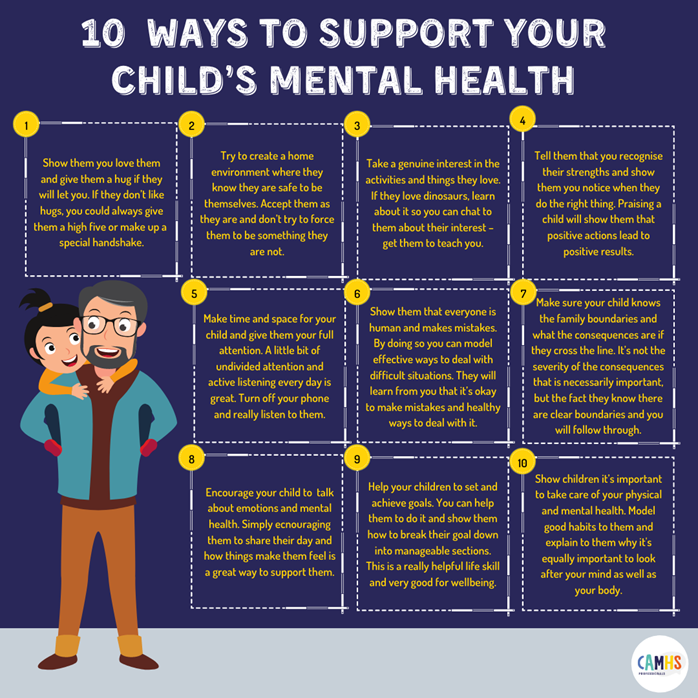National Wellbeing Services


BBC Headroom
Resources to help talk about mental health; everyday tips; personal stories; activities to boost your mood; looking after yourself and your family; wellbeing for young people; relaxing; sleep; music to support your mood; other resources and information/support
www.bbc.co.uk/programmes/articles/YfRzhXDKSZQxFVn30TlXBj/your-mental-health-toolkit
Campaign Against Living Miserably (CALM)
Support for men in the UK of any age who are down or in crisis via a helpline, webchat and website.
www.thecalmzone.net 0800 585858
Make it Count – A guide for parents and carers from the Mental Health Foundation
This guide is for parents and carers to help children understand, protect, and sustain their mental health.
www.mentalhealth.org.uk/publications/make-it-count-guide-for-parents-and-carers
Mermaids
Mermaids supports gender-diverse children and young people until their 20th birthday, as well as their families and professionals involved in their care.
MIND – A charity campaigning for everyone experiencing a mental health problem to get support and respect.
Information and Support
NSPCC – Children’s mental health: Guides for parents
Advice for parents to help them support their child / children / a child / children known to them who may be experiencing depression, anxiety, suicidal feelings or self-harm.
www.nspcc.org.uk/keeping-children-safe/childrens-mental-health/
Place2Be - Supporting your child's mental health
Parents / carers / families have an important role in teaching children and young people how to understand and manage their feelings as they grow up.
www.place2be.org.uk/our-services/parents-and-carers/supporting-your-child-s-mental-health/
Rethink Mental Illness
Provides a range of services nationally and locally, including advocacy, carer support and crisis services
www.rethink.org 0121 5227007
Samaritans
Whatever you're going through, a Samaritan will face it with you. We're here 24 hours a day, 365 days a year.
www.samaritans.org 116 123 (24/7)
Saneline
Provides out of hours mental health and emotional support and information to anyone affected by mental ill health including friends, family and carers.
0300 304 7000 (6pm-11pm 7 days a week)
www.sane.org.uk
Stonewall
Stonewall campaigns for the equality of lesbian, gay, bi and trans people across Britain.
Young Minds – fighting for young people’s mental health
Parenting isn’t always easy! And it’s OK to ask for / seek help.
Children and young people display many changes in behaviour as a part of growing up. These changes may be part of being a teenager, but in some cases, they could be a sign of a developing mental health conditions.
Action for Children have a simple way to help adults remember some of the most common signs that can be useful to look out for if you have concerns about a child or young person’s mental health – ‘MASK’:
M – Mood – Children and young people can become argumentative, aggressive, display negative emotions, and be self-critical. Young people can also become withdrawn.
A – Actions – Look out for changes in eating or sleeping patterns. Other indicators can be signs of bullying, substance misuse (drug or alcohol use) or self-harm (cutting, burning, punching hard surfaces, hair-pulling etc.) For more information on self-harm visit: Self Harm UK
S – Social – Losing touch with friends, a change in friendship groups, appearing lonely or withdrawn can all be signs of a mental health illness. Missing school and losing interest in hobbies etc. are also indicators.
K – Keep Talking – It is common for children and young people to not want to talk about their feelings. Do not give up, carry on asking how they are feeling. Let them know you care and will be there for them.
It can be difficult to talk about mental health issues. For children and young people there may be the concern of being labelled or stigmatised; concern about upsetting those around them; or fear of what may happen to them. For parents and carers there may be concerns about saying the wrong thing; making the situation worse; or concern about treatments.
One of the best things you can do for a child with mental illness is to make them feel safe and loved. Create an atmosphere in your home that is highly supportive, and low in stress. Structure can be vital in helping to create a low-stress environment. Parents and carers could try making a contract with their child that says they’ll talk (or write down/text etc.) if they’re struggling and when they need help. This gives children a safe way to explain their feelings.
Part of a safe environment is having the space for open communication and dialogue. Support your child to be well-versed in self-identifying by regularly asking how they are and checking up. It’s important for parents to help children dealing with mental illness learn how to calm themselves down, identify emotions, and understand how it affects their behaviour. It can be useful to use the ‘Triangle of Feelings’ exercise from Action for Children to help your child understand how we think, feel and behave each influence each other.
Some parents fear that the beginning of mental health issues for their child is the end of having a happy, healthy life, but this isn’t usually the case. In fact, many people who struggle with mental illness lead extremely fulfilling lives.
It’s virtually impossible to be completely prepared for what’s to come when a child is diagnosed with mental illness. Naturally, there can be a huge learning curve. Ultimately, your experience of navigating your child’s mental illness will be personal to you. While it’s almost unavoidable that you’ll make mistakes along the way or react poorly at times, you have to be able to forgive yourself. You will likely experience a combination of many conflicting feelings along the way, and that’s okay. You need to look after your own mental health for you to effectively help your child; give yourself time and space and don’t feel you have to do it by yourself.
You are not alone—there are many resources there to help you and your child. Ultimately the most important thing you can do is to love and support your child. Just remember - it’s a process.
You will find a range of links on these webpages for organisations and charities who work to support children, young people, and their parents through episodes of mental health illness.
If you have concerns about your child, you can also contact your G.P., school nurse or school’s safeguarding team for support and signposting.
All children in school have access to our Universal Offer, which includes:
- ‘Lived values’
- Trauma informed ethos and environment
- All staff trained in emotion-coaching
- Curriculum
- Assemblies inc. ‘Healthy Mind, Happy Me’ class assemblies
- Nests
- Safeguarding/Pastoral office available
- Well-Being Hub
- Trusted Adult available to all
If you have concerns for your child’s mental health, we are able to offer the following:
Kaleidoscope Be Cre8tive
Young Carers Group- in school
Sandwell Young Carers
School Health Nurse
AOC for Art Therapy/Drama Therapy
Breaking Silence
Looking Forward
Breaking Barriers
Strong Minds Brave Hearts
CAMHS
If you feel that you, or your child would benefit from support, please fill in our self-referral form.









